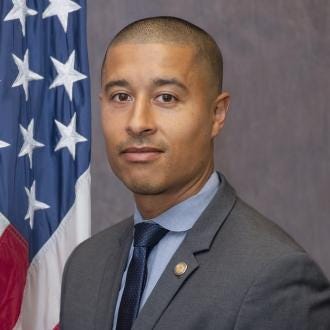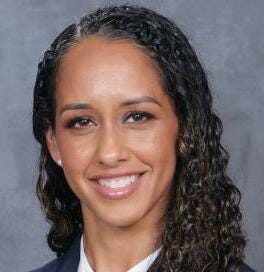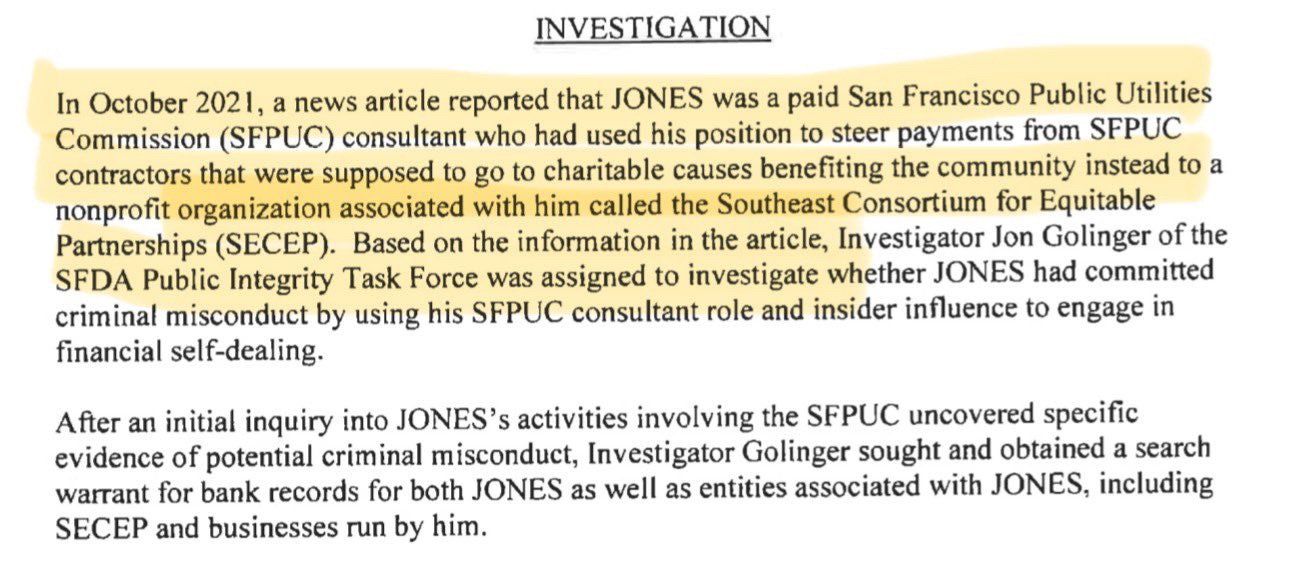Former Boudin staffer Ryan Khojasteh and police commissioner Max Carter-Oberstone to challenge SFDA Brooke Jenkins
Sources also says Joe Alioto Veronese may consider a second run after finishing a distant third in 2022 race
Sources tell me that former Chesa Boudin staffer Ryan Khojasteh will hold a press conference at 12:15 p.m. tomorrow, Jan. 26, at the Department of Elections to announce a run for San Francisco District Attorney. If the name sounds familiar, Khojasteh penned a whiny San Francisco Chronicle opinion piece titled “Brooke Jenkins just fired me and 14 others. I have no idea how the D.A.’s office will run without us.” In it the former public defender wrote, “I was on vacation and on my way to a wedding the day Jenkins and two representatives from human resources called me on my personal cell phone to fire me.”
Well, that’s what happens when you’re out of the office on “extended leave.”
Khojasteh was particularly angry that the new D.A. fired “15 staffers who were effective members of the team.” “Effective” is a strong word considering the majority, including 99 percent of the management team, took Boudin up on his offer of extended leave, skipping out on 5,500 outstanding cases which Khojasteh admits were “on average, nearly two years old” — in other words, during Boudin’s tenure. “Perhaps Jenkins may be able to hire some new attorneys in the coming months, but even the most talented attorneys will not be able to be brought up to speed to help lighten the load anytime soon.” Khojasteh says this unironically, despite the fact that under Boudin 59 attorneys left, including 37 who quit and 11 who were fired.
Several people who worked in the DA’s Office told me that Boudin wasn’t a fan of Khojasteh (one actually said “Boudin hated Ryan”) and that Boudin was embarrassed when Khojasteh spoke out during the recall. “He only had him working there because he helped his campaign,” one source said.
It didn’t help — Boudin was ousted on June 8, 2022.
As for his own work? Khojasteh says in his Chronicle diatribe that he took it seriously and was good at his job, though photographs posted on social media showed his cubicle floor scattered with files and his mail slot overflowing with unopened envelopes, some likely containing time sensitive information about his cases. After all, it would be tough to open mail while “sitting in the back of your mom’s car on the highway.”

As he complains in his Chronicle piece about the “unfair firings,” Khojasteh never acknowledges that positions in the district attorney’s office are “at will,” meaning you can be cut loose at any time for any reason.
He also neglects to mention that just two days after Boudin was sworn in, he fired seven attorneys. One prosecutor told me the original number was 14, but more bad press made Boudin nervous. Just weeks later when that prosecutor quit, he says Boudin looked right at him and asked, “Who will try homicide cases?” to which he replied, “You fired them all.”
At the time, Boudin told the press the dismissals were necessary to carry out his agenda, stating, “I had to make difficult staffing decisions today in order to put in place a management team that will help me accomplish the work I committed to do for San Francisco.”
So, both Boudin and Jenkins fired people. The only difference is Boudin fired qualified prosecutors and replaced them with unqualified public defenders, while Jenkins fired unqualified public defenders and replaced them with qualified prosecutors.
Besides his penchants for whining and untidiness, Khojasteh has zero skills for the job. At least his former boss, Boudin, was a Rhodes scholar, though even that couldn’t help sculpt him from a former public defender who saw repeat violent offenders simply as wayward souls into a competent district attorney representing victims of crime.
Another source tells me that Joe Alioto Veronese may run for DA again. That one seems like a long shot to me, considering he received zero percent of the votes in the third round of ranked choice voting for the 2022 election, coming in a distant third behind winner Jenkins and second place John Hamasaki, a private defense attorney and former police commissioner. Hamasaki came across as a completely unhinged cop hater throughout the campaign, hurling misogynistic insults at Jenkins and female reporters (this one included) while deleting over 8,500 tweets he feared were incriminating (they were, and unfortunately for Hamasaki, he forgot the Internet is forever).

The other rumored challenger for Jenkins’s job is Max Carter-Oberstone, controversial vice president of the mostly reviled San Francisco Police Commission. Don’t let his babyface fool you — Oberstone loves to attack citizens and journalists on X (though he’s no Hamasaki) while helping reporters who share his far left ideology write anti-law enforcement stories. Oberstone, who spent 2021 as an Orrick Fellow with New York University School of Law’s Policing Project, is the commissioner who came up with the ban on “pretextual police traffic stops.” In a May 11, 2022, op-ed for Time titled, “America’s Traffic Laws Give Police Way Too Much Power,” Oberstone opines that America’s traffic codes “are so numerous and sprawling that the average driver can scarcely hope to spend a few minutes behind the wheel without committing an infraction … It’s only a matter of time before any driver falls prey to the minefield of traffic infractions that awaits them every time they fire up the engine.”
Oberstone says that even hanging an air freshener from the rearview mirror can get you pulled over and ticketed. That seems a bit dramatic — I have one of my pitbull Skylar’s dog tags, a turquoise beaded bolo with a crystal-encrusted pewter mermaid, and a Harley Quinn baseball bat charm hanging from my rearview mirror and I have yet to be pulled over. (I did, however, receive a ticket for not having a front license plate while I was parked along the Embarcadero.)
According to Oberstone, his regulations prohibit “stops for low-level traffic offenses, like failure to illuminate your license plate. If you can’t stop someone for this type of offense, you can’t leverage it as a pretext for further investigation.” He says officers can “still enforce the low-level violations if they wish. All they need to do is take down the driver’s license plate number and send them a ticket in the mail.” Just what cops need — more paperwork.
Another part of Oberstone’s regulation limits “consent searches,” which prohibits officers from asking for consent to search cars once they’ve pulled the driver over “except under certain narrow circumstances,” which he says will “reduce the incentive to make pretextual stops in the first place, as well as the temptation to go searching for a needle in a haystack.” However, as I’ve written in the past, it’s often not something mundane that officers find during those searches. For example, on Aug. 18, 2019, San Francisco police officers pulled over a vehicle with no license plates. The driver, Kenan Shackelford, had a suspended license. Officers asked Shackelford and his female passenger to step out of the car to conduct an inventory search before the car was towed and discovered a loaded semi-automatic pistol in the center console. The serial number appeared to have been deliberately removed. Both subjects were handcuffed while officers searched the trunk, where they found a dog (yes, you read that right — a dog) and called Animal Care and Control. Along with the dog, officers found four loaded high-capacity magazines in a bag. After the pair was read their rights at the station, the female stated the gun was Shackelford’s and that he normally stored it in the center console or in the bag where the magazines were found. Shackelford invoked his right to remain silent. Officers obtained DNA samples from both suspects and Shackelford was booked on multiple felony gun charges.
Like the rest of the Police Commission, nearly everything Oberstone says and does, both in his role as a commissioner and on his social media, is anti-SFPD.
Meanwhile, incumbent San Francisco District Attorney Brooke Jenkins has managed to stay above the fray, dodging haters with the chops of Taylor Swift at a Kansas City Chiefs game. Not everything has gone her way — Jenkins has come up against the city’s notoriously lenient judges and kooky juries in two high profile cases.
The trial of Lamonte Mims and Fantasy Decuir, who were caught on camera shooting and killing 71-year-old photographer and film location scout Ed French while robbing him of his camera in the early morning hours of July 16, 2017, atop Twin Peaks, will be tried again because the jury hung 10-2 in favor of guilty on the murder charge for both defendants, as well as on one of the second-degree robbery charges for Decuir. The District Attorney’s Office plans to try both Mims and Decuir again on the murder charge.
In the case of Louisiana transient Garret Doty, who nearly beat former fire commissioner Don Carmignani to death with a metal pipe for “disrespecting him,” a jury acquitted Doty not because the vicious attack was in doubt (it was also caught on video) but because, according to juror Mike Brophy, a 50-year-old tech worker who moved to San Francisco several years ago, a November 2021 security video of a man spraying a sleeping homeless person with a can of pepper or bear spray was "damning” because “it looked like Carmignani.” Brophy said the jury agreed Carmignani was reprehensible. "We were all convinced the initial belligerent here was Carmignani," Brophy continued. "I really don't like the feeling of my city trying to be an apologist for a known belligerent, a known vigilante." Apparently Brophy and his fellow jurors were unaware that Carmignani wasn’t the one on trial.
There’s not a lot a DA can do when judges and juries choose to ignore facts and/or the law, but Jenkins has been steadfast in keeping her promises to San Franciscans. She has a strong relationship with SFPD as well as with state law enforcement agencies, and it seems to be paying off: there was a 7 percent drop in overall crime from 2022 and a 13 percent decrease from 2019. Property crimes, as well as violent crimes, have dipped to some of the lowest numbers in the last decade, with car break-ins and retail theft leading the descent. Violent crime remains below pre-pandemic levels, falling by 11 percent compared to 2019.
Under Jenkins, there has also been an uptick in the prosecution of drug dealers — in fact, SFPD has doubled drug arrests in neighborhoods like the Tenderloin and South of Market. Unlike Boudin, who said fentanyl dealers were human trafficking victims (which I proved was a myth), Jenkins sees them for exactly who they are: heartless poison peddlers making thousands of dollars to send home to their families, mostly in Honduras, where they build mansions while traveling back and forth across the border.
Another area where Jenkins has surprised and impressed me is her dedication to arresting City Hall insiders for their decades of corruption. For example, I have been writing about Dwayne Jones for years, and while it flew under the nose of Boudin, it didn’t under Jenkins, who charged Jones with 59 counts of fraud. (The investigation documents mention one of my articles from October 2021.) So critics who said Jenkins would be a “City Family patsy” were clearly wrong — and if I were some of the other officials mentioned in my corruption articles, I wouldn’t be sleeping very well.
Is San Francisco out of the woods? No way. Has it gotten better under Jenkins during her 18-month tenure? Definitely. Do residents want to see what progress the city has made slide backward under yet another public defender playing district attorney? I doubt it.





Thank you, Susan, for keeping the pressure on and continuing to expose corruption.